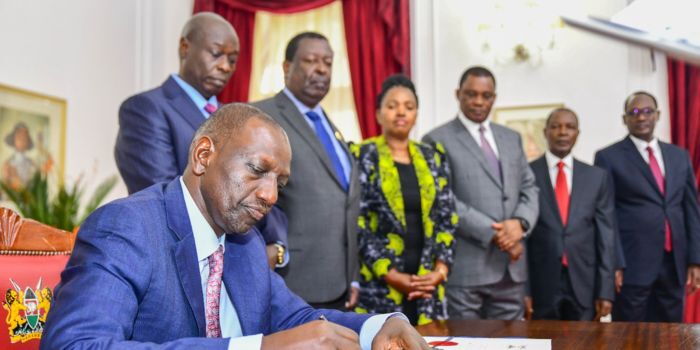Kenyans witnessed numerous proposed changes in laws in 2024, some of which were outrichtly rejected after triggering a mass uprising.
With President William Ruto’s Kenya Kwanza Government entering its second year, Kenyans saw the introduction of many Bills in a bid for the president to shore up the government’s source of revenue.
According to statistics by the National Council for Law Reporting, the country saw the introduction of 38 Bills in 2024. A number of these Bills shocked Kenyans with some of the demands and restrictions they proposed.
This article examines some of the bills that shocked Kenyans the most.
The Finance Bill 2024
This legislation introduced punitive taxes to Kenyans and its intensity could not be taken lightly. With the Bill, President Ruto aimed at raising Ksh346 billion from taxes to offset Kenya’s debt and fund development projects.
The bill proposed several new taxes, including a 16 per cent VAT on bread, a 25 per cent excise duty on vegetable oil, and a 16 per cent VAT on sugar cane transportation just to mention a few.
It was met with immense rejection by Kenyans who demanded President Ruto to withdraw it. After several protests dubbed Gen Z protests that saw Kenyan youths storm the Parliament buildings on July 25, President Ruto finally withdrew it.
The Social Health Insurance Fund(SHIF) Bill
The Bill proposed the changing National Hospital Insurance Fund (NHIF) to the Social Health Insurance Fund(SHIF). SHIF introduced a 2.75 per cent deduction from gross salaries for health insurance, an additional fee from the Ksh500 Kenyans were paying for NHIF.
This means that Kenyans pay for the insurance according to the gross pay they earn, the lowest amount is Ksh300 and the highest can go up to over Ksh20,000.
Despite the proposal being met with hostility among Kenyans and even rejection at some point, the government implemented it in October 2024. It has been three months since it took effect and Kenyans are still complaining.
Mung Beans (Ndengu) Bill
Although proposed in 2022, the Mung Bean Bill gained popularity in 2024 when Kenyans understood what it was proposing.
Members of the National Assembly during a previous Parliamentary session.
National Assembly
The Bill sought to restrict farmers from marketing, processing, or engaging in extensive trade of the produce or its byproducts without a license from the county government.
Additionally, it proposed that all farmers register with the relevant county executive committee (CEC) member in charge of agriculture. Those who failed to register would face a Ksh1,000,000 fine.
The Bill steered conversations among Kenyans and stakeholders, and eventually, it was dropped by the National Assembly in September.
The 7-Year Term Limit
Although it died at the motion stage, the 7-year term limit motion elicited a heated reaction and debate in the country. Proposed by Nandi Senator Samson Cherargei, the motion proposed that the limit to the Presidential term, the Members of Parliament, Senators, and Governors be increased from the current five years to seven years.
The motion has sparked significant debate and reactions from various politicians and Kenyans at large. Led by the need to reject it, Kenyans flooded the Senate Clerk’s mail with over 300,000 emails just rejecting it. This caused the mail to crash.
In a counter-move, Kiambu Senator Karungo Thang’wa proposed a reduction of term limits for elected leaders to four years. 2025 will uncover more political dynamics as the general elections first approach.
Protesters during the anti-Finance Bill demonstrations in Kenya.
Photo
Mint


